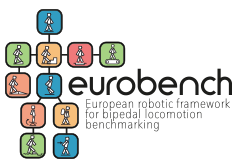The 2nd EUROBENCH Open Call of the Financial Support to Third Parties (FSTP) has funded 40 proposals to test their robotic technologies in the first reference framework for bipedal robotics in Europe. Feedback from these third parties will be used to validate the usability (effectiveness, efficiency and satisfaction) of the EUROBENCH framework.
Considering the technologies to be tested, 72.59% of the proposals are related to exoskeletons, 21.49% to humanoids, 3.72% to prostheses and 2.20% to non-biped systems.
The FSTP-2 Call launched three options to participate:
Option 1. In situ experiments. Test experiments are carried out in one of the two EUROBENCH facilities (either the wearable robot facility or the humanoid facility). The objective is to realise a real robotic system or control algorithm using the EUROBENCH testbeds and software.
Option 1 Funded Projects–FEAT – Functional Ergonomic and neuro-muscular Assessment of TWIN-Acta exoskeleton
–Auxivo AG – EUROBENCH Framework Validation for Industrial Exoskeletons
–S@EB – Sweaty@EUROBENCH
-NOP2XBENCH – Benchmarking the Humanoid Open Platform NimbRo-OP2X
–EXOSMOOTH – Test of innovative EXOskeleton control for SMOOTH assistance, with and without ankle actuation
–AssistControl-H3 – Performance Assessment of Model-Based Assistance Controllers for Lower Limb Exoskeletons: Exo-H3 Case Study
–HUMATRAN – Bioinspired balance of HUMAnoid robots for TRANsport tasks
–BELK – Biomechanical Assessment of BELK exoskeleton in different benchmarking scenarios
–SLEDGE – Shoulder Loads in Exoskeleton-assisted Daily life Gestures
–AXBAP Project – Axiles Bionics Alpha-Pilot Project
–TO RANK – Testing and Optimization of a Robotic ANKle
–NeuroGait – Assistive locomotion based on non-invasive real-time neural interfacing
–Adaptive –KO – Adaptive – Knee Orthosis
–XSPINE – Exoskeleton Support in Industrial Operations
–TestABLE – TESTing the performance of the ABLE exoskeleton in several Eurobench scenarios
–WALKBENCH – Benchmarking walking and balancing for humanoid robots
–DECODED – Decoding brain activity related to gait during exoskeleton-assisted walking
–CosmoRob – Combining Sensor-based Motion Tracking with Wearable Robotics for Empowering the Validation of Robotic Technologies
–NEXT – Neurorehabilitation EXoskeleton Test
–PROPELLING – Pushing forward robot development for lawmaking 1
–INTENTION – Improving Human-Robot Interaction through EMG-Onset Controller for Lower Limb Exoskeletons
-HumaBeliefs – Benchmarking Humanoid Belief Space Locomotion Planning
–PELLEXER – Performance Evaluation of Lower Limb Exoskeletons for Emergency Response Forces
–New Balance PIs – Novel Performance Indicators for the Characterization of Balance Capabilities in Generic Biped Systems and during Various Tasks
-AUT-STRE-1 – Investigation on control strategies for assistng hemiplegic users in daily mobility
Option 2. Remote experiments. Test experiments to be conducted in Third parties’ own laboratories. The goal is to perform a real robotic system by using the UROBENCH software.
Option 2 Funded Projects–FAET – Force-aware Exoskeleton Training
-FEATStroke – Functional Ergonomic and neuro-muscular Assessment of TWIN-Acta exoskeleton adapted for persons post-Stroke
–EUROBIONICS – EUROBIONICS
-SLIDER – Straight-Legged Bipedal Developmental Robot
–tested-2.0 – Benchmark for Benchmarking Industrial Exoskeleton Technology: Remote Experiments at CTAG Pilot Line for Performance Indicators Verification Related To Assembly Lines
–Adaptive – KOD – Adaptive – Knee Orthosis on DORIS
–ESCALATE– ExoSkeleton-assisted Community AmbuLAtion of healthy and sTrokE subjects
-NIMBENCH – Benchmarking affordable 3D-printed NimbRo humanoid robots
–REKINE – Reconstructing kinematics trajectories during walking from EEG signals
-HumaBiMan – Benchmarking Humanoid Locomotion and Standing Performances during Dynamic Autonomous Bi Manipulation of Objects
–HANK – Experimental Validation of HANK exoskeleton using different biomechanical evaluation test methods
–REMOTE_XSPINE – REMOTe Evaluation of eXoskeleton SuPport in INdustrial opErations
–Thertact-FB – Thermotactile feedback for improved exoskeleton control
–SAMURAI – Improving exoskeleton-assisted motor training: muscular fatigue assessment as a risk factor for spasticity in Spinal Cord Injuries
Option 3. Retrospective data analysis. Use EUROBENCH software to process retrospective data from robots or humans. The goal is to perform a robotic system or produce high-quality performance reference data from healthy or impaired individuals. All the collected and processed data are uploaded and integrated into the EUROBENCH Database.
Option 3 Funded Projects-RCUPBENCH – Novel Performance Indicators for the Characterization of Balance Capabilities in Generic Biped Systems and during Various Tasks

